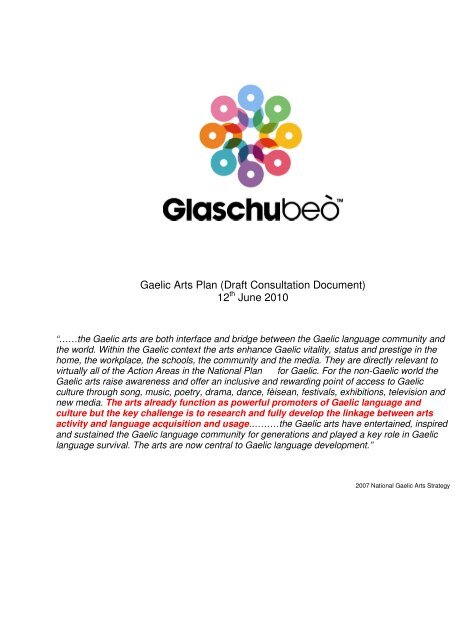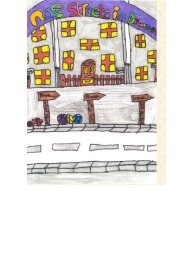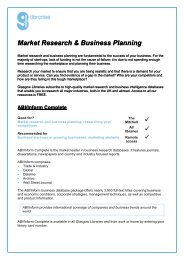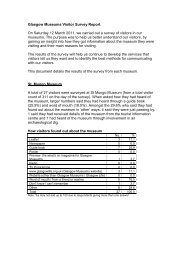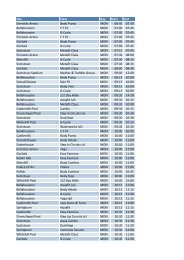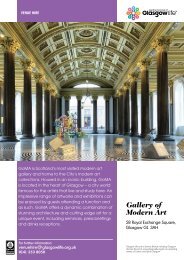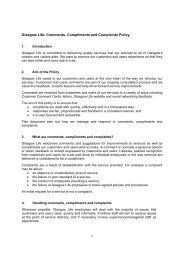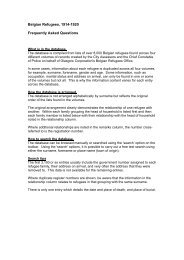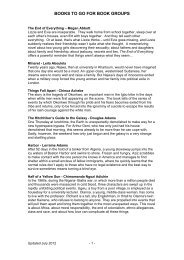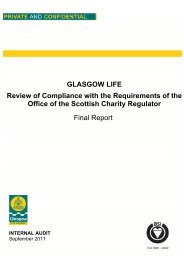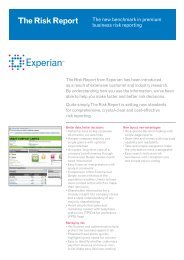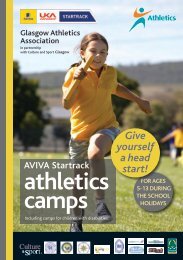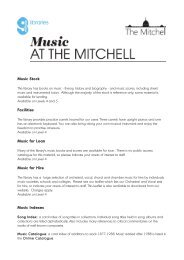Gaelic Arts Plan (Draft Consultation Document) 12th ... - Glasgow Life
Gaelic Arts Plan (Draft Consultation Document) 12th ... - Glasgow Life
Gaelic Arts Plan (Draft Consultation Document) 12th ... - Glasgow Life
You also want an ePaper? Increase the reach of your titles
YUMPU automatically turns print PDFs into web optimized ePapers that Google loves.
<strong>Gaelic</strong> <strong>Arts</strong> <strong>Plan</strong> (<strong>Draft</strong> <strong>Consultation</strong> <strong>Document</strong>)<br />
12 th June 2010<br />
“……the <strong>Gaelic</strong> arts are both interface and bridge between the <strong>Gaelic</strong> language community and<br />
the world. Within the <strong>Gaelic</strong> context the arts enhance <strong>Gaelic</strong> vitality, status and prestige in the<br />
home, the workplace, the schools, the community and the media. They are directly relevant to<br />
virtually all of the Action Areas in the National <strong>Plan</strong> for <strong>Gaelic</strong>. For the non-<strong>Gaelic</strong> world the<br />
<strong>Gaelic</strong> arts raise awareness and offer an inclusive and rewarding point of access to <strong>Gaelic</strong><br />
culture through song, music, poetry, drama, dance, fèisean, festivals, exhibitions, television and<br />
new media. The arts already function as powerful promoters of <strong>Gaelic</strong> language and<br />
culture but the key challenge is to research and fully develop the linkage between arts<br />
activity and language acquisition and usage.………the <strong>Gaelic</strong> arts have entertained, inspired<br />
and sustained the <strong>Gaelic</strong> language community for generations and played a key role in <strong>Gaelic</strong><br />
language survival. The arts are now central to <strong>Gaelic</strong> language development.”<br />
2007 National <strong>Gaelic</strong> <strong>Arts</strong> Strategy
1. Foreword<br />
The first <strong>Gaelic</strong> <strong>Arts</strong> <strong>Plan</strong> was prepared in 2005 and set out ambitious plans for the years from 2006 to 2009. Much<br />
has been achieved over those three years through a series of partnerships both large and small. In his foreword to<br />
the initial strategy, Boyd Robertson, then Chair of An Lòchran, wrote that ‘together we can extend and diversify<br />
<strong>Gaelic</strong> cultural activity in <strong>Glasgow</strong> and increase awareness of, and access to, a precious cultural heritage.’ This<br />
remains the focus of the new <strong>Gaelic</strong> <strong>Arts</strong> <strong>Plan</strong> – partnership and increasing access and awareness of the <strong>Gaelic</strong><br />
language and the arts.<br />
The context has changed with the creation of <strong>Glasgow</strong> City Council new <strong>Gaelic</strong> Language <strong>Plan</strong> and the<br />
appointment of a <strong>Gaelic</strong> Development officer for the City. In April 2010 Creative Scotland (Alba Chruthachail) came<br />
into existence and appointed a national <strong>Gaelic</strong> <strong>Arts</strong> Officer aswell as committing to developing a new <strong>Gaelic</strong><br />
Language <strong>Plan</strong> and the Scottish Government has approved Bord na Gàidhlig’s national Action <strong>Plan</strong> to increase the<br />
number of <strong>Gaelic</strong> speakers through Ginealach Ùr na Gàidhlig.<br />
The arts have a vital role to play in ensuring the survival and development of the language and this is highlighted in<br />
the draft plan. The plan also aims to build on the successful achievements of the past three years. Some of these<br />
such as Ceol ’s Craic and the Feis Ghlaschu have become an established part of the cultural scene in the city.<br />
Whilst others such as the theatre piece No ‘V’ in <strong>Gaelic</strong> and Leabhar’s Craic are projects that point the way to<br />
future developments. The growth of the <strong>Gaelic</strong> community and the success of Sgoil Gàidhlig Ghlaschu have<br />
ensured a visible presence in the city and increased demand for the <strong>Gaelic</strong> <strong>Arts</strong> and providing opportunities to use<br />
the language and promote access to <strong>Gaelic</strong> forms of expression.<br />
Working with a relatively small community presents opportunities in that planning can be focussed and successes<br />
clearly identified. The draft plan is deliberately broad-based to encourage ideas that will take <strong>Gaelic</strong> arts in the city<br />
forward in fresh and exciting ways in the years leading up to the Commonwealth Games in 2014 and beyond.<br />
Charles Bell, June 2010
2.<br />
Context<br />
The key measures for the protection and expansion of <strong>Gaelic</strong> are:<br />
• the Scottish Government’s <strong>Gaelic</strong> Language (Scotland) Act 2005<br />
• the establishment of Bòrd na Gàidhlig (2006) to guide and support the promotion of <strong>Gaelic</strong> via local<br />
authorities and government agencies to develop and implement <strong>Gaelic</strong> Languages <strong>Plan</strong>s<br />
• Ginnealach Ùr na Gàidhlig – Bord na Gàidhlig April 2010 – March 2012<br />
• <strong>Glasgow</strong> City Council’s <strong>Gaelic</strong> Language <strong>Plan</strong><br />
Also at a national arts level, Pròiseact nan Ealan (<strong>Gaelic</strong> <strong>Arts</strong> Agency) has robustly pioneered arts and cultural<br />
events to promote <strong>Gaelic</strong>. The agency works in collaboration with the <strong>Gaelic</strong> <strong>Arts</strong> Strategic Development Forum<br />
(GASD Forum) to position <strong>Gaelic</strong>, arts, culture and language as a priority for growth, development and funding;<br />
Creative Scotland and Bòrd na Gàidhlig have recently co-funded the first-ever national <strong>Gaelic</strong> <strong>Arts</strong> Officer post, and<br />
Fèisean na Gàidheal (FnG) has revitalised and re-established the Fèis movement.<br />
<strong>Gaelic</strong> in <strong>Glasgow</strong><br />
As part of the renaissance of <strong>Gaelic</strong>, the city has seen over the last ten years or so, a burgeoning of <strong>Gaelic</strong> arts and<br />
cultural events, mostly visible through the international gathering of musicians, singers, storytellers and dancers at<br />
Celtic Connections, a <strong>Gaelic</strong> presence at the city’s other events and festivals such as Aye Write!, the West End<br />
Festival and GLASCHU BEÒ’s festival for young people, Inspiration.<br />
With support from Glaschu Beò and many partners, Ceol ‘s Craic has developed into the social hub for <strong>Gaelic</strong> in<br />
the city. They aim is to encourage participation in <strong>Gaelic</strong> culture, by presenting exciting and innovative arts events<br />
in a social setting. As an independent organisation they now host the only all <strong>Gaelic</strong> literary event, Leabhar ‘s<br />
Craic, an annual film festival Film ‘s Craic and a three day festival during Celtic Connections presenting new<br />
innovative <strong>Gaelic</strong> artists.<br />
Just as significant is <strong>Glasgow</strong>’s pioneering <strong>Gaelic</strong> education in the city. This will have a significant impact on the<br />
survival of the language. Sgoil Gàidhlig Ghlaschu provides a service for 3-18 years olds; has a current roll of 518<br />
and has been a stand alone school for 10 years.<br />
Other highlights include:<br />
• the growth in <strong>Gaelic</strong> medium nursery and primary school numbers: approx. 60 and 310 respectively; a<br />
new <strong>Gaelic</strong> medium primary school being investigated in the south side of <strong>Glasgow</strong> and the opening of<br />
the first <strong>Gaelic</strong> secondary school in 2006 with a current school roll of 150;<br />
• Stow College’s <strong>Gaelic</strong> Language Access Course for learners and a Higher <strong>Gaelic</strong> course;<br />
• various <strong>Gaelic</strong> courses organised by Glaschu Beò (GLASCHU BEÒ) in a variety of community halls<br />
and a Family Learning Group which meets at the <strong>Glasgow</strong> <strong>Gaelic</strong> School attracting a regular 120<br />
people on a Saturday morning;<br />
• University of Strathclyde is the main provider of <strong>Gaelic</strong> teacher training in Scotland; it also offers<br />
classes in traditional music and song<br />
• University of <strong>Glasgow</strong>’s Celtic Department provides courses at both under-graduate and post-graduate<br />
level, along with a programme for <strong>Gaelic</strong> learners; the university has just recently appointed its first<br />
<strong>Gaelic</strong> Development Officer, funded by BnG for two years as a pilot project<br />
• RSAMD; Strathclyde University and The Piping Centre both offer classes in traditional music and song,<br />
with RSAMD offering a degree in Piping.<br />
• These are underpinned by the numerous Highland Associations, an annual Mòd, several <strong>Gaelic</strong> choirs,<br />
and church services in the city.
2.3 <strong>Gaelic</strong> <strong>Arts</strong> Strategy 2006-9<br />
In 2004 <strong>Glasgow</strong> City Council (GCC) made its commitment to <strong>Gaelic</strong> <strong>Arts</strong> by employing a <strong>Gaelic</strong> <strong>Arts</strong> Development<br />
Officer (GADO). For a period of time the city worked in collaboration with An Lòchran with the GADO being located<br />
and employed by <strong>Glasgow</strong> City Council. By 2007, An Lòchran’s plans changed and they withdrew from this<br />
partnership. Around the same time, Glaschu Beò became the agency responsible for the delivery of GCC’s arts<br />
and sports activities. GLASCHU BEÒ continued to deliver and support the <strong>Gaelic</strong> <strong>Arts</strong> Strategy and as was firmly<br />
established in the independent evaluation, it has been successful in achieving all it’s aims.<br />
• Delivery of an annual <strong>Gaelic</strong> arts programme<br />
• Promote and raise profile of <strong>Gaelic</strong> <strong>Arts</strong><br />
• Collaborate with key <strong>Gaelic</strong> arts agencies<br />
• Develop <strong>Gaelic</strong> arts activities across art form<br />
• Develop links with existing <strong>Gaelic</strong> arts community<br />
• Devise Audience Development Strategy<br />
• Contribute to debate on arts provision in Scotland<br />
• Build an infrastructure for <strong>Gaelic</strong> <strong>Arts</strong> in <strong>Glasgow</strong><br />
• <strong>Gaelic</strong> arts initiatives to relation to gaps in provision<br />
We are delighted that An Lòchran have been part of the development of the <strong>Gaelic</strong> Hub which creates for the city a<br />
context for the <strong>Gaelic</strong> communities and Glaschu Beò through it’s language and arts programme would welcome an<br />
opportunity to contribute to this.<br />
From our independent evaluation it was found that The <strong>Gaelic</strong> <strong>Arts</strong> Development programme has employed an<br />
inclusive approach with <strong>Gaelic</strong> being implicitly at the heart of decision-making. This inclusive approach is in line with<br />
GLASCHU BEÒ, BnG and SAC’s funding criteria.<br />
The inclusive approach means the activity or event is<br />
• open and flexible and<br />
• breaks down barriers of exclusion (<strong>Gaelic</strong> itself can be the barrier)<br />
• addresses the needs of the artistic community<br />
• develops a new audience for new arts activities<br />
• generates a renewed interest in <strong>Gaelic</strong> for an already captured audience<br />
• changes the perception of the arts from being an ‘exclusive pursuit’ to the arts<br />
being ‘for everyone’<br />
This approach feeds into short, medium and long-term activities to support the increased use of <strong>Gaelic</strong> and its<br />
sustainability as a living language with a vibrant, accessible cultural life.<br />
From its inception in 2004 the aim of <strong>Gaelic</strong> <strong>Arts</strong> Development has been to develop a contemporary urban <strong>Gaelic</strong><br />
arts programme. This was achieved through a series of pilot projects which then developed into sustainable<br />
independent organisations. In a relatively short period of time these activities have demonstrated that there is a<br />
clear demand for such a programme.<br />
A chronological list of activities and events for 2004-2009 is attached as Appendix 1.
4. <strong>Gaelic</strong> <strong>Arts</strong> <strong>Plan</strong> 2010-2014<br />
<strong>Gaelic</strong> Language <strong>Plan</strong><br />
Glaschu Beò aspiration of achieving a vibrant and living <strong>Gaelic</strong> community as part of <strong>Glasgow</strong> City Council’s <strong>Gaelic</strong><br />
language <strong>Plan</strong> is one that is seriously tackled. Within our services at Glaschu Beò we have two dedicated officers<br />
and many other support officers, who have the knowledge and experience to ensure that this becomes a reality and<br />
a shared vision for the city.<br />
Glaschu Beò plays a key role in supporting <strong>Glasgow</strong>’s rich <strong>Gaelic</strong> culture. It does this predominantly through its<br />
community and family learning, its arts programmes, its developing library collection and its support of events<br />
and celebrations.<br />
It has a range of commitments in the <strong>Glasgow</strong> Language <strong>Plan</strong> across this spectrum and has carried out an<br />
active <strong>Gaelic</strong> awareness development programme with staff to ensure that our Company’s thinking and planning<br />
is inclusive of <strong>Gaelic</strong>.<br />
As recognised across a range of national and local thinking, the ambition to improve people’s range and use of<br />
<strong>Gaelic</strong> language skills needs an environment that allows that to happen. Such an environment needs to provide<br />
a range of routes into learning, and programmes that meet people’s different learning styles and needs. It also<br />
needs a breadth of programme that lets people use the language in a range of cultural, leisure and social ways.<br />
Learning a language will only be successful if you have different routes to use and expand that language either<br />
through your personal, family, community or working life.<br />
Glaschu Beò’s works with a range of other partners to help this happen in <strong>Glasgow</strong>. Its specific role, in what<br />
needs to be a broad spectrum of contributions, is helping support a rich community and cultural programme. It<br />
allows people a first entry into the language and supports the creative expression and culture of those whose<br />
language skills are more developed.<br />
Its range of services help support a healthy community programme that attracts people from a range of<br />
distances from <strong>Gaelic</strong> language and culture, keeping it dynamic and with the best chance of thriving.<br />
<strong>Gaelic</strong> <strong>Arts</strong> <strong>Plan</strong><br />
Following a broad consultation, the <strong>Gaelic</strong> <strong>Arts</strong> <strong>Plan</strong> for 2010-14 offers many opportunities for the language and<br />
profile of <strong>Gaelic</strong> in the build up to the Commonwealth Games. As the largest city in Scotland we have a significant<br />
opportunity to contribute to the national context and we have an arts infrastructure (both <strong>Gaelic</strong> and non-<strong>Gaelic</strong>)<br />
unique in Scotland to have an enhanced impact.<br />
Glaschu Beò have developed a programme that focuses on the four key themes of the national <strong>Gaelic</strong> Language<br />
<strong>Plan</strong>. We are experience in developing and initiating <strong>Gaelic</strong> <strong>Arts</strong> Strategies and have a proven track record through<br />
our annual <strong>Gaelic</strong> <strong>Arts</strong> Programme.<br />
Alba Chruthachail has inherited the investment commitment of the Scottish <strong>Arts</strong> Council and Scottish Screen and<br />
wishes to work with partners to ensure the arts are appreciated by a diversity of audiences. Their investment in<br />
<strong>Gaelic</strong> will be through support for “activity such as drama, new writing and learning through arts in communities,<br />
helping to increase the number of <strong>Gaelic</strong> speakers by providing more opportunities for people to use the <strong>Gaelic</strong><br />
language”. Alba Chruthachail is committed to drafting a <strong>Gaelic</strong> Language plan for Spring 2011. Glaschu Beò’s<br />
<strong>Gaelic</strong> <strong>Arts</strong> <strong>Plan</strong> 2010-14 meets these aims<br />
This next phase of <strong>Gaelic</strong> <strong>Arts</strong> development will focus on the aims of both Bord na Gàidhlig and Alba Chruthachail<br />
acquiring data on how participation in our events contribute to language use and acquisition aswell as ambitiously<br />
tackling the need for further research between the arts and language.<br />
Our programme in 2010-14 will focus on establishing opportunities for participation and use of <strong>Gaelic</strong>, spearheading<br />
a flagship event with city wide and national organisations as part of the Commonwealth games celebration,<br />
increasing the visibility of <strong>Gaelic</strong> language through creative interventions and complimenting and reinforcing the<br />
many learning opportunities that Glaschu Beò deliver.
5. City Wide Partners<br />
Over the course of the last 6 years of <strong>Gaelic</strong> <strong>Arts</strong> Development we have formed relationships with a variety of<br />
diverse organisations that have varying degrees of partnerships with Glaschu Beò. Some of these organisations’<br />
sole purpose is the delivery of <strong>Gaelic</strong> <strong>Arts</strong> and others have a different remit but produce (or aspire to) <strong>Gaelic</strong> <strong>Arts</strong><br />
within their programme.<br />
One of the purposes of the <strong>Gaelic</strong> <strong>Arts</strong> <strong>Plan</strong> is to articulate the breadth of the <strong>Gaelic</strong> <strong>Arts</strong> sector in <strong>Glasgow</strong>, to<br />
express how these city-wide partners contribute to a significant presence in terms of the national <strong>Gaelic</strong> <strong>Arts</strong><br />
landscape, and to start mapping out how these organisations can best work with GLASCHU BEÒ and with each<br />
other. These organisations include:<br />
• The <strong>Gaelic</strong> Books Council;<br />
• Celtic Connections (GLASCHU BEÒ);<br />
• <strong>Arts</strong> Development (GLASCHU BEÒ)<br />
• Community Learning (GLASCHU BEÒ)<br />
• Ceol ‘s Craic;<br />
• An Lòchran;<br />
• Comman Na Gàidhlig;<br />
• The National Piping Centre;<br />
• <strong>Glasgow</strong> University;<br />
• RSAMD;<br />
• TOG-I;<br />
• UNESCO City of Music;<br />
• CCA;<br />
• Trongate 103 (GLASCHU BEÒ)<br />
City–wide partners and <strong>Glasgow</strong>’s <strong>Gaelic</strong> Language <strong>Plan</strong> aim to:<br />
• to support the <strong>Gaelic</strong> <strong>Arts</strong> <strong>Plan</strong> 2010-2014<br />
• Participate in annual meetings<br />
• Collaborate where appropriate in <strong>Gaelic</strong> <strong>Arts</strong> development<br />
• Share information and networks<br />
• Identify areas of common partnership - detailed in table of recommendations<br />
6. Art Form Development & new research<br />
As part of <strong>Glasgow</strong>’s <strong>Gaelic</strong> Art <strong>Plan</strong> we hope that our Art form development is a fluid and on-going element of our<br />
plan. This section of the plan is about capturing the development areas in <strong>Gaelic</strong> <strong>Arts</strong>; promoting the discussion,<br />
creating forums and networks, gauging opinion and allowing the GAP to be flexible and responsive. It is our<br />
recommendation that these themes are discussed annually in the city.<br />
We hope to:<br />
• Develop networks/ discussion groups across these themed areas (see table of recommendation)<br />
• Ensure that there is an on-going and progressive dialogue for the community and artists<br />
• Provide a point of access to practitioners to avoid duplication and allow artists to ‘come in’ to a more developed<br />
discussion – instead of going round in circles.<br />
Below we have detailed each priority art from and have included some quotes for discussion and bullet points<br />
• Drama; Visual <strong>Arts</strong>; Music; <strong>Arts</strong> in Education and Literature.<br />
As part of the <strong>Gaelic</strong> <strong>Arts</strong> Strategy 2006-9 Glaschu Beò with partner agencies undertook to deliver ‘a new agenda of<br />
research, historical and cultural exploration…to enable a greater understanding of <strong>Gaelic</strong> identity’. This was<br />
achieved through Audience Development research and strategy (2007) and an Economic Impact study of <strong>Gaelic</strong><br />
<strong>Arts</strong> to <strong>Glasgow</strong>. These resources are available for national agencies and city – wide partners to help them develop<br />
their programmes for language use, acquisition and status.
The new <strong>Gaelic</strong> <strong>Arts</strong> <strong>Plan</strong> embraces these sentiments and would like to further enhance the importance of research<br />
in <strong>Gaelic</strong> <strong>Arts</strong>. This is especially true in the need to link the importance of the arts with language aquistion. The<br />
arts provides opportunities for the socialisation of the language, an informal access points across a spectrum of<br />
leaning and a platform for inspiration for people learning and using <strong>Gaelic</strong>, young people in the home and at school<br />
and adults in the community.<br />
In this plan we identify the next phase of the Economic Impact Study now that we have base figures to build from, a<br />
relationship with <strong>Glasgow</strong> University to develop links with language and the arts – through a proposed case study of<br />
Ceol ‘s Craic over two years and a series of lectures to enable pupils, tourists and parents to understand more<br />
about he place of <strong>Gaelic</strong> within Scotland’s wider historical linguistic and cultural environment<br />
For more details see appendix 2<br />
7 Up-date on <strong>Gaelic</strong> Language <strong>Plan</strong><br />
Glaschu Beò has the following responsibility in <strong>Glasgow</strong>’s <strong>Gaelic</strong> <strong>Arts</strong> <strong>Plan</strong><br />
• Evaluate the current <strong>Gaelic</strong> <strong>Arts</strong> Strategy<br />
• Develop the <strong>Gaelic</strong> <strong>Arts</strong> Strategy 2009 to 2012 and identify funding streams/ infrastructure to support it<br />
• Build links in the arts strategy to council services particularly education services<br />
• Support the national <strong>Gaelic</strong> arts agency in developing the national <strong>Arts</strong> Strategy<br />
We are ahead of schedule in delivering these responsibilities. In June 2010 we completed the evaluation<br />
of the current <strong>Gaelic</strong> <strong>Arts</strong> Strategy. This was completed by an independent evaluator who co-ordinated<br />
an on-line survey; held one-to-one interviews with city and national partners and undertook desk<br />
research of all activity from 2004. The draft <strong>Gaelic</strong> <strong>Arts</strong> <strong>Plan</strong> was devised following consultation with city<br />
wide partners, the findings of the evaluation report and then Glaschu Beò held a public consultation on<br />
the GAP on June 12 th where further comments and suggestions were incorporated into the GAP. The<br />
current draft has been available on-line for anyone to comment on since 30 th June 2010 and this will<br />
come to an end on 30 th August 2010. We are still collating feedback but the current draft incorporates<br />
further suggestions from city wide partners. The final stage before we start identify funding streams and<br />
infrastructure to support it will be a meeting with all city wide partners hosted by Glaschu Beò in order to<br />
reach a meaningful consensus.<br />
8. <strong>Gaelic</strong> <strong>Arts</strong> <strong>Plan</strong> – Delivery Programme<br />
NEW CONTEXT AND INFRA-STRUCTURE<br />
Theme Output Partners<br />
Create a refreshed,<br />
and necessary, modus<br />
operandi amongst all<br />
the partners, old and<br />
new, as to how best to<br />
maintain good<br />
communication, and<br />
how to exploit each<br />
other’s strengths to<br />
achieve the common<br />
goal. The <strong>Gaelic</strong><br />
community is small<br />
and needs a positive<br />
and collaborative way<br />
of working to improve<br />
its profile and to<br />
attractive audiences<br />
and funding<br />
National & City-wide partners adopt and support <strong>Glasgow</strong>’s<br />
<strong>Gaelic</strong> <strong>Arts</strong> <strong>Plan</strong><br />
A cohesive programme of <strong>Gaelic</strong> <strong>Arts</strong> activity<br />
An Annual <strong>Glasgow</strong> <strong>Gaelic</strong> <strong>Arts</strong> Forum / event<br />
Maintain a dedicated GADO post for 2010 -2014<br />
Work with national agencies such as BnG and Creative<br />
Scotland to create an inventive and intelligent funding<br />
package to deliver the <strong>Gaelic</strong> <strong>Arts</strong> <strong>Plan</strong><br />
Create a robust exit strategy 2014<br />
Seek resources to make the GADO post full-time to deliver the<br />
next stage of the <strong>Gaelic</strong> <strong>Arts</strong> Development <strong>Plan</strong><br />
Seek resources to appoint Audience Development resource<br />
for <strong>Gaelic</strong> org in <strong>Glasgow</strong> (see below)<br />
Seek resources for International <strong>Gaelic</strong> Festival in lead up to<br />
Commonwealth Games<br />
All national & city wide<br />
partners<br />
Develop working<br />
framework with the new<br />
National <strong>Gaelic</strong> <strong>Arts</strong><br />
Officer<br />
Work with GCC’s <strong>Gaelic</strong><br />
Development Officer<br />
regarding the<br />
implementation GAP of<br />
GCC’s <strong>Gaelic</strong> Language<br />
<strong>Plan</strong><br />
Identify effective ways to<br />
contribute to the GASD<br />
Forum<br />
Maintain active<br />
membership of <strong>Glasgow</strong><br />
<strong>Gaelic</strong> <strong>Arts</strong> Officers<br />
group
GAELIC LANGUAGE – USE & ACQUISITION<br />
Position an ‘inclusive approach’ as a viable and sustainable strategy to develop accessible <strong>Gaelic</strong> arts activity to<br />
support <strong>Glasgow</strong> City Council’s <strong>Gaelic</strong> Language <strong>Plan</strong>. We will encourage greater use of <strong>Gaelic</strong>, provide<br />
opportunities to use the language and promote access to <strong>Gaelic</strong> Forms of expression.<br />
Language Use<br />
& Acquisition –<br />
Action Area<br />
and theme<br />
Adult Learning/<br />
Promotion of<br />
language<br />
Acquisition,<br />
Early Years<br />
Adult Learning,<br />
Promotion of<br />
<strong>Gaelic</strong><br />
acquisition<br />
Adult Learning<br />
5-18yrs<br />
Education<br />
Support for<br />
Parents<br />
3-5 & 5-18 yrs<br />
Education<br />
Flagship Event<br />
1<br />
Promotion of<br />
<strong>Gaelic</strong><br />
acquisition<br />
Support for<br />
parents<br />
Art Form<br />
Development<br />
Programme<br />
Develop city-wide conversation cafés throughout artistic<br />
programme<br />
<strong>Gaelic</strong> language Workshop for musicians<br />
Develop <strong>Gaelic</strong> language skills and training for tutors<br />
<strong>Gaelic</strong> Literature Festival<br />
Creative Writing Workshops for adults and young people<br />
• (Continue with) <strong>Gaelic</strong> Singing Workshops at City<br />
Halls<br />
• Support Women’s <strong>Gaelic</strong> Singing Group<br />
• Identify Opportunities to develop <strong>Gaelic</strong> Song at<br />
Sgoil Gàidhlig Ghlaschu in line with national<br />
initiatives<br />
• Support the development of a <strong>Gaelic</strong> woman’s<br />
book collection at <strong>Glasgow</strong>’s Women’s Library<br />
Liaise and support Ceol ‘s Craic<br />
to encourage participation in <strong>Gaelic</strong> culture, by presenting<br />
exciting and innovative arts events in a social setting.<br />
Development of <strong>Gaelic</strong> Art Form Networks/ discussion<br />
forums in themed areas:<br />
• Visual Art discussion forum<br />
• <strong>Arts</strong> in Education<br />
• Drama<br />
<strong>Glasgow</strong> City Council<br />
City wide <strong>Gaelic</strong> partners<br />
<strong>Arts</strong> Agencies in city<br />
Main partners - Ceol ‘s<br />
Craic, Fèis Ghlaschu, and<br />
An Lòchran<br />
Appropriate venues<br />
throughout the city CCA, the<br />
<strong>Gaelic</strong> Hub, Celtic<br />
Connections, Piping Live,<br />
<strong>Gaelic</strong> School, <strong>Gaelic</strong> Books<br />
Council<br />
Early Years Violin; Colour<br />
Strings; Saturday Morning<br />
Music Club; and High<br />
School Bands<br />
Ceol ‘s Craic, <strong>Gaelic</strong> Books<br />
Council, Glaschu Beò, CCA<br />
and other agencies<br />
<strong>Gaelic</strong> Books Council,<br />
Community Learning, CCA<br />
GlaschuBeo<br />
GlaschuBeo & CCA<br />
Sgoil Gàidhlig Ghlaschu &<br />
Glaschu Beò<br />
<strong>Glasgow</strong> Women’s Library,<br />
Glaschu Beò, aelic Books<br />
Council<br />
Ceol ‘s Craic, Creative<br />
Scotland, <strong>Gaelic</strong> Books<br />
Council, Celtic Connections,<br />
Colm Cille, CCA, <strong>Glasgow</strong><br />
Film Festival, Proiseact nan<br />
Ealan,<br />
Visual Art - CCA, Tramway,<br />
attendees at GAP – email<br />
network<br />
Education - <strong>Arts</strong> education<br />
officers across city and SGG
• Literature<br />
• Music<br />
schools programme)<br />
Education Networks from<br />
pre-school to university,<br />
including <strong>Glasgow</strong><br />
University; Education<br />
Officers at CSG and<br />
Learning Teaching Scotland<br />
Drama Development Forum<br />
(CNAG, An Lochran,<br />
RSAMD, Tog-i)<br />
Literature - Aye Write,<br />
<strong>Gaelic</strong> Books Council,<br />
Ghlaschu Beo (literary<br />
Officer, Community learning<br />
Officer <strong>Gaelic</strong> <strong>Arts</strong> Officer)<br />
Music - Ceol ‘s Craic,<br />
UNESCO city of Music,<br />
Ghlaschu Beo, Celtic<br />
Connections, Sgoil Gàidhlig<br />
Ghlaschu<br />
Film – Film ‘s Craic – MG<br />
ALAB, BBC ALBA, <strong>Glasgow</strong><br />
Film Festival. Celtic Film<br />
Festival, CCA, Film G<br />
Next stage – we host a meeting with our city partners to ensure that all relevant aims and objectives for <strong>Gaelic</strong> <strong>Arts</strong><br />
are met in <strong>Glasgow</strong>.<br />
From that we will add a timeframe and initial costings to our delivery programme which will be followed by a period<br />
of planning and fundraising for these objectives
Language Status<br />
Working with all city-wide and national partners to increase the visibility and develop audiences for <strong>Gaelic</strong>.<br />
Enhancing its recognition and create positive image for <strong>Gaelic</strong> in <strong>Glasgow</strong><br />
Profile &<br />
Visibility<br />
- Action Area &<br />
theme<br />
Promotion of<br />
<strong>Gaelic</strong><br />
Acquisition<br />
Flagship<br />
Event 2<br />
School’s<br />
Programme<br />
0-5, 5-18yr<br />
Education<br />
Flagship<br />
Event 3<br />
Promotion of<br />
<strong>Gaelic</strong><br />
acquisition<br />
Promotion of<br />
<strong>Gaelic</strong><br />
acquisition<br />
Promotion of<br />
<strong>Gaelic</strong><br />
acquisition<br />
Programme<br />
Employ for <strong>Glasgow</strong>’s <strong>Gaelic</strong> sector a highly skilled professional audience<br />
development manager with a research budget<br />
Review and implement the 2007 Audience Development <strong>Plan</strong><br />
Establish for <strong>Glasgow</strong>’s <strong>Gaelic</strong> sector a <strong>Gaelic</strong> <strong>Arts</strong> Internship (lasting at<br />
least one year)<br />
Consult with the <strong>Gaelic</strong> sector regarding <strong>Gaelic</strong> Festival , linking these in<br />
with 2012 Olympic Games and 2014 Commonwealth Games<br />
<strong>Gaelic</strong> Song<br />
Colour strings in early years<br />
<strong>Gaelic</strong> Song tutor<br />
Develop a project/resource to aid teachers to promote <strong>Gaelic</strong> Song in the<br />
primary and secondary school along the lines of Orain na Bliadhna<br />
School choir and mod representation<br />
Drama<br />
Develop <strong>Gaelic</strong> Drama opportunities through the formal curriculum.<br />
Develop opportunities through extra–curricular activity with partner agencies<br />
Continue involvement with Feis Oigridh<br />
Events<br />
Junior Celtic Connections event in partnership with Ceol ‘s Craic and Celtic<br />
Connection – over three nights.<br />
Promote an annual showcase concert at a Glaschu Beò venue to promote<br />
the <strong>Gaelic</strong> <strong>Arts</strong> at Sgoil Gàidhlig Ghlaschu<br />
Explore the idea of a <strong>Gaelic</strong> Art form Brand for national and citywide<br />
partners<br />
Develop <strong>Gaelic</strong> logos/ signage with<br />
CCA/ Trongate 103/<br />
Celtic Connections<br />
And relevant CSG venues/ events including AyeWrite, Pipe Band<br />
Championships<br />
Develop a <strong>Gaelic</strong> Identity within CSG web communications<br />
Partners<br />
.<br />
Sgoil Gàidhlig<br />
Ghlaschu<br />
PnE
LANGUAGE CORPUS<br />
Research<br />
Action Area & theme<br />
Promotion of <strong>Gaelic</strong><br />
acquisition<br />
Education 0-18<br />
Adult Learning<br />
Support for parents<br />
Promotion of <strong>Gaelic</strong><br />
acquisition<br />
Education 0-18<br />
Adult Learning<br />
Support for parents<br />
Programme<br />
Commission Stage 2 of Economic Impact of <strong>Gaelic</strong><br />
<strong>Arts</strong> to the city of <strong>Glasgow</strong><br />
New Research following 2011 census into <strong>Gaelic</strong> <strong>Arts</strong><br />
Audiences<br />
Work in partnership with <strong>Glasgow</strong> University and the<br />
cultural policy centre to identify connection with <strong>Gaelic</strong><br />
<strong>Arts</strong> and language Acquisition<br />
Partners<br />
Caledonian University<br />
CSG, GCC<br />
Cultural Policy Centre at<br />
<strong>Glasgow</strong> Uni
Appendix 1<br />
(there may be some small errors in this information – we’re still gathering data from partners and projects)<br />
2004<br />
Jan –<br />
Sept<br />
Development of the ideas of the Fèis Ghlaschu<br />
and Steering Group<br />
<strong>Glasgow</strong> City<br />
Council<br />
An Lòchran<br />
Fèisean Nan<br />
Gaidheal<br />
N/A<br />
N/A<br />
2004<br />
Oct<br />
2004<br />
April<br />
2004<br />
May -<br />
Aug<br />
2004<br />
Sept -<br />
Dec<br />
2005<br />
Jan –<br />
Dec<br />
2005<br />
May<br />
2005<br />
May<br />
Pilot Fèis Ghlaschu during October holiday at the<br />
<strong>Gaelic</strong> Primary School,<br />
Ashley Street<br />
Exhibition at <strong>Glasgow</strong> Art Fair<br />
Development of the ideas the Cèol ‘s Craic and<br />
Steering Group<br />
Cèol ‘s Craic at Uisge Beatha<br />
Development of <strong>Gaelic</strong> <strong>Arts</strong> Strategy<br />
Flagship Event<br />
Flower of the West Concert<br />
Film for Flower of the West<br />
<strong>Glasgow</strong> City<br />
Council<br />
Giant<br />
Productions<br />
Community<br />
Learning<br />
Artists in Exile<br />
<strong>Glasgow</strong> Art<br />
Fair<br />
<strong>Glasgow</strong> City<br />
Council<br />
Cèol ‘s Craic<br />
Steering<br />
Group<br />
<strong>Glasgow</strong> City<br />
Council<br />
An Lòchran<br />
Scottish <strong>Arts</strong><br />
Council<br />
<strong>Glasgow</strong> City<br />
Council<br />
An Lòchran<br />
An Lòchran<br />
<strong>Glasgow</strong> City<br />
Council<br />
Bòrd na<br />
Gàidhlig<br />
Hugh Watt<br />
GDO<br />
GCC<br />
£2,500<br />
GCC<br />
£500 in kind<br />
N/A<br />
GCC<br />
£2,500<br />
N/A<br />
Scottish<br />
Enterprise<br />
£12,500<br />
BnG<br />
£1,500<br />
22<br />
12,000<br />
N/A<br />
Sept 35<br />
Oct 53<br />
Nov 45<br />
Dec 75<br />
N/A<br />
2,000<br />
Sold Out<br />
N/A<br />
2005<br />
May –<br />
July<br />
2005<br />
May –<br />
July<br />
2005<br />
April<br />
2005<br />
March<br />
Flower of the West Touring Visual <strong>Arts</strong><br />
Exhibition | <strong>Glasgow</strong>, North Uist, Skye<br />
Flower of the West<br />
<strong>Gaelic</strong> <strong>Arts</strong> Seminars at each venue<br />
Flower of the West Children’s Visual<br />
Art Workshops<br />
Fèis Ghlaschu | Venue | Partick Burgh Hall<br />
An Lòchran<br />
<strong>Glasgow</strong> City<br />
Council<br />
Taigh<br />
Chearsabhagh<br />
AnTuireann<br />
Tramway<br />
Tramway<br />
FG Steering<br />
Group (An<br />
Lòchran &<br />
Parent Reps)<br />
<strong>Glasgow</strong> City<br />
Council<br />
Fèisean Nan<br />
Gàidheal<br />
SAC<br />
£5,800<br />
BnG 3,500<br />
Atlantic<br />
£2,000<br />
BnG<br />
£600<br />
Venues in<br />
kind £250<br />
GCC<br />
£100<br />
GCC<br />
£2,500<br />
FnG £1,500<br />
GCC in kind<br />
£750<br />
Community<br />
Learning<br />
£150<br />
Box Office<br />
Tramway<br />
500<br />
Taigh<br />
Chearsa<br />
7,000<br />
An Tuireann<br />
3,500<br />
Tramway 40<br />
Taigh<br />
Chearsa<br />
12<br />
18<br />
44
2005 Fiddle and Clarsach Workshops<br />
8 weeks<br />
<strong>Glasgow</strong><br />
<strong>Gaelic</strong> School<br />
<strong>Glasgow</strong> City<br />
Council<br />
Comunn na<br />
Gàidhlig<br />
2005 Cèol ‘s Craic at Uisge Beatha <strong>Glasgow</strong> City<br />
Council<br />
An Lòchran<br />
2006 Cèol ‘s Craic at Uisge Beatha <strong>Glasgow</strong> City<br />
Council<br />
An Lòchran<br />
2006 Cèol ‘s Craic at Centre for Contemporary<br />
<strong>Arts</strong><br />
<strong>Glasgow</strong> City<br />
Council<br />
An Lòchran<br />
Stow College<br />
CCA<br />
£610<br />
GCC<br />
£400<br />
FnG £780<br />
GCC<br />
£2,500<br />
GCC<br />
£2,500<br />
GCC<br />
£2,500<br />
SAC<br />
£5,000<br />
GCC ChYP<br />
ADO<br />
£500<br />
23<br />
Jan 30<br />
Feb 24<br />
Mar 50<br />
Apr 72<br />
May 75<br />
June 75<br />
Jan 71<br />
Feb 89<br />
Mar 83<br />
Apr 53<br />
May 39<br />
Sept 150<br />
Oct 100<br />
Nov 120<br />
Dec 170<br />
2006<br />
April<br />
Fèis Ghlaschu | Venue | Partick Burgh Hall<br />
Introduction of Young Apprentices and Colour<br />
Strings<br />
2006 Storytelling with Art and Drama -<br />
Anne Lorne Gillies<br />
2006-<br />
2007<br />
2006-<br />
2009<br />
2007<br />
Jan<br />
Research and development of <strong>Gaelic</strong> <strong>Arts</strong> Audience<br />
Development <strong>Plan</strong><br />
Research and development of ideas for Economic<br />
Impact of <strong>Gaelic</strong> <strong>Arts</strong> to <strong>Glasgow</strong> City Council<br />
Flagship Event<br />
There’s No ‘V’ in <strong>Gaelic</strong><br />
FG Steering<br />
Group (An<br />
Lòchran &<br />
Parent Reps)<br />
<strong>Glasgow</strong> City<br />
Council<br />
Fèisean Nan<br />
Gàidheal<br />
<strong>Glasgow</strong> City<br />
Council<br />
Comunn na<br />
Gàidhlig<br />
Citizens’<br />
Theatre<br />
<strong>Glasgow</strong> City<br />
Council<br />
<strong>Gaelic</strong> <strong>Arts</strong><br />
Strategic<br />
Dev Forum<br />
(GASD)<br />
<strong>Glasgow</strong> City<br />
Council<br />
Scottish<br />
<strong>Arts</strong> Council<br />
<strong>Glasgow</strong> City<br />
Council<br />
GCC 66<br />
£3,000<br />
SAC<br />
£3,000<br />
FnG<br />
£2,367<br />
FnG<br />
£600<br />
CnG<br />
£424<br />
City Action<br />
£750<br />
Com<br />
Learning<br />
£400<br />
£tbc 18<br />
GASD Forum<br />
£12,000<br />
GCC<br />
£2,000<br />
BnG<br />
£2,000<br />
GCC<br />
(DRS) £4,000<br />
(AD)<br />
£2,500<br />
SAC<br />
£5,000<br />
NTS £5,000<br />
SAC<br />
Launch Event<br />
- 70<br />
N/A<br />
3 x Perfs<br />
Total 300
Venue | Citizens’ Theatre<br />
National<br />
Theatre of<br />
Scotland<br />
An Lòchran<br />
Citizens<br />
Theatre<br />
£19,000 Sold Out<br />
2006<br />
Aug -<br />
2007<br />
There’s No ‘V’ in <strong>Gaelic</strong> 8 Week workshop<br />
programme with young women<br />
2007 Cèol ‘s Craic at Centre for Contemporary<br />
<strong>Arts</strong><br />
2007<br />
April<br />
Fèis Ghlaschu | Venue | CCA<br />
<strong>Glasgow</strong> City<br />
Council<br />
National<br />
Theatre of<br />
Scotland<br />
An Lòchran<br />
Citizens<br />
Theatre<br />
<strong>Glasgow</strong> City<br />
Council<br />
Celtic<br />
Connections<br />
CCA<br />
Stow College<br />
<strong>Glasgow</strong> City<br />
Council<br />
National Piping<br />
Centre<br />
CCA<br />
As above<br />
SAC<br />
£5,000<br />
C’Cille<br />
£2,500<br />
GCC<br />
£3,500<br />
CnG £420<br />
8 participants<br />
Jan 276<br />
Feb 120<br />
Mar 70<br />
Apr 80<br />
May 91<br />
Sept 89<br />
Oct 92<br />
Nov 75<br />
Dec 99<br />
88<br />
2007<br />
April<br />
2008<br />
Jan<br />
<strong>Gaelic</strong> <strong>Arts</strong> Audience Development<br />
Strategy | Research complete and<br />
document produced<br />
Flagship Event<br />
3 day-long music festival at Celtic<br />
Connections<br />
2008 Cèol ‘s Craic at Centre for Contemporary<br />
<strong>Arts</strong><br />
<strong>Glasgow</strong> City<br />
Council<br />
<strong>Glasgow</strong><br />
Grows<br />
Audience<br />
An Lòchran<br />
CCA<br />
Celtic<br />
Connections<br />
Colm Cille<br />
Culture &<br />
Sport <strong>Glasgow</strong><br />
Celtic<br />
Connections<br />
CCA<br />
Colm Cille<br />
Ceolas<br />
BnG £500<br />
GCC<br />
£4,500<br />
SAC<br />
£5,000<br />
Colm Cille<br />
£2,250<br />
Ceolas<br />
£500<br />
N/A<br />
150 each day<br />
= 450<br />
Sold Out<br />
Feb 61<br />
Mar 97<br />
Apr 88<br />
May 33<br />
Sept 40<br />
Oct 18<br />
Dec 33<br />
2008<br />
April<br />
2008<br />
Jan-<br />
Dec<br />
2008<br />
May<br />
Fèis Ghlaschu Venue | St. Aloysius<br />
Glaschu Beò<br />
Fèiseann nan<br />
Gàidheal<br />
CC £3,948<br />
Colm Cille<br />
£4,500<br />
FnG £3,940<br />
GLASCHU<br />
BEÒ £2,000<br />
Accordion Club (4 classes) Glaschu Beò GLASCHU<br />
BEÒ<br />
Parents<br />
Leabhar ‘s Craic<br />
First <strong>Gaelic</strong> Literary Festival<br />
Culture &<br />
Sport <strong>Glasgow</strong><br />
BnG £1,800<br />
<strong>Gaelic</strong> Books<br />
103<br />
28<br />
Adults 44<br />
Child 18
2008<br />
May<br />
to date<br />
2009<br />
Jan<br />
2009<br />
Jan<br />
Venue | CCA<br />
Youth Music Initiative<br />
(2 year programme)<br />
Venue | <strong>Glasgow</strong> <strong>Gaelic</strong> School<br />
• Early years violin<br />
• Colour Strings<br />
• Monday After School Band, Saturday<br />
Morning Club<br />
• <strong>Gaelic</strong> Song<br />
3-day <strong>Gaelic</strong> Film Festival<br />
Venue | CCA<br />
Premier <strong>Gaelic</strong> Film Festival<br />
19 Screenings, Talks, Q&A, panel discussions<br />
Cèol’s Craic at Celtic Connections<br />
3-day music festival Venue | CCA<br />
<strong>Gaelic</strong> Books<br />
Council<br />
CCA<br />
Glaschu Beò<br />
Bòrd na Gàidhlig<br />
<strong>Glasgow</strong> <strong>Gaelic</strong><br />
School<br />
MG Alba<br />
Celtic<br />
Connections<br />
CCA<br />
Glaschu Beò<br />
Celtic<br />
Connections<br />
Colm Cille<br />
Council<br />
£2,000<br />
GLASCHU<br />
BEÒ Lit ADO<br />
£700<br />
SAC<br />
£30,000<br />
BnG £4,500<br />
MG Alba<br />
£7,000<br />
Celtic<br />
Connections<br />
£in kind<br />
CCA<br />
£500<br />
Celtic<br />
Connections<br />
£4,500<br />
Colm Cille<br />
£3,500<br />
CCA £500<br />
Book Launch<br />
89<br />
Evening<br />
Event 89<br />
Mon ASC<br />
Core of 20<br />
Sat Club<br />
Core of 25<br />
Early Years<br />
43<br />
Colour<br />
Strings 60<br />
220<br />
3 x 150<br />
Sold Out<br />
2009 Cèol ‘s Craic at Centre for Contemporary<br />
<strong>Arts</strong><br />
2009<br />
April<br />
2009<br />
Jan –<br />
Dec<br />
2009<br />
May<br />
2009<br />
Feb<br />
Fèis Ghlaschu Venue | RSAMD<br />
Accordion Club at the <strong>Glasgow</strong> <strong>Gaelic</strong><br />
School<br />
Leabhar ‘s Craic<br />
Venue | CCA<br />
Launch of The Economic Impact of <strong>Gaelic</strong> <strong>Arts</strong> &<br />
Culture within <strong>Glasgow</strong><br />
Glaschu Beò<br />
<strong>Gaelic</strong> Books<br />
Council<br />
Colm Cille<br />
CCA<br />
Glaschu Beò<br />
Fèiseann nan<br />
Gàidhlig<br />
<strong>Glasgow</strong><br />
<strong>Gaelic</strong><br />
School<br />
Glaschu Beò<br />
<strong>Gaelic</strong> Books<br />
Council<br />
CCA<br />
<strong>Glasgow</strong><br />
Caledonian<br />
University<br />
Universy of<br />
the West of<br />
Scotland<br />
<strong>Glasgow</strong><br />
City Council<br />
SAC £5,000<br />
SAC (for coordinator)<br />
£5,000<br />
BnG £2,500<br />
Colm Cille<br />
£2,500<br />
C’Cille/Foras<br />
nG £1,250<br />
GLASCHU<br />
BEÒ<br />
£2,500<br />
FnG tbc<br />
GLASCHU<br />
BEÒ<br />
<strong>Gaelic</strong> Books<br />
Council,<br />
CCA<br />
GLASCHU<br />
BEÒ<br />
tbc<br />
GCC | DRS<br />
£3,000<br />
Feb 73<br />
Mar 87<br />
Apr 89<br />
May 96<br />
Sept 33<br />
Oct 20<br />
Nov 79<br />
Dec 98<br />
96<br />
25 approx.<br />
per term<br />
tbc<br />
N/A
Appendix 3<br />
Art forms Development<br />
Drama<br />
Drama has a unique problem in relation to <strong>Gaelic</strong>. In non-<strong>Gaelic</strong> theatre there is a thriving drama infrastructure,<br />
particularly in <strong>Glasgow</strong>. There are many writers, designers, technicians, directors, stage managers and actors. In<br />
<strong>Gaelic</strong> there is a lack of base materials, writers who want to develop new work and actors and theatre companies<br />
that can devise new work.<br />
<strong>Gaelic</strong> Drama has a crucial role to play in the promotion and survival of the language and culture in <strong>Glasgow</strong>. As<br />
well as the broader benefits of representation of <strong>Gaelic</strong> on the stage – entertainment, a commentary on<br />
contemporary issues, insights into society, behaviour, laughter etc - for the <strong>Gaelic</strong> community (from learner to fluent<br />
speaker) a thriving drama sector is crucial to the acquisition and status of a language. <strong>Gaelic</strong> speakers need to see<br />
themselves on stage to maintain a confidence in their identity and to ensure their relevance in contemporary<br />
society.<br />
Citizen theatre Artistic Director Guy Hollands has a lot of personal dramaturgical expertise in script development<br />
and directing – this includes a lot of development for TOSG and working in translation.<br />
“Touring theatre in <strong>Gaelic</strong> needs to connect more with the rest of the industry. It needs to be made sexy and to be<br />
seen as cutting-edge. The fact of its being 'culturally important' isn't enough. Ideally? I obviously believe that drama<br />
could and should have a major role in the promotion of <strong>Gaelic</strong> culture - both in terms of touring work in the language<br />
and in terms of awareness raising, teaching about <strong>Gaelic</strong> culture, history in schools and other appropriate contexts”<br />
Current themes<br />
• RSAMD of open space day 18 th May. Exploring issues and development for the creation of a new<br />
Drama/<strong>Gaelic</strong> course at RSAMD and Sabhal Mor Ostaig<br />
• CNAG Iomairtean – Youth Drama Project at RSAMD with partnership agencies. Looking at develoing<br />
project for future applicants to the proposed new course<br />
• Following on from Iomairean – New <strong>Gaelic</strong> Drama Development Group<br />
• Tog-I – <strong>Glasgow</strong> <strong>Gaelic</strong> School pilot workshops – 2 x 10 week course with 14 participants<br />
• Community Learning projects – working with film and editing<br />
• National Theatre of Scotland – Iain Finaly MacLeod’s project – Bi-lingual<br />
Summary of discussion on June <strong>12th</strong><br />
Sarah Walker, Lorenzo Mele (GLASCHU BEÒ), Ruth Mitchell (Renfrewshire Council), Catriona Murray (parent),<br />
Arthur Donald (<strong>Glasgow</strong> Youth Theatre), Liz Carruthers (parent, director, RSAMD), Phyllis Steele (<strong>Gaelic</strong> Evaluation<br />
Study), Susan Galloway (parent), Mo Staggs (parent)<br />
• During the performances today - where was the drama? People are more portable than instruments especially<br />
Clarsachs.<br />
• Liz Carruthers – Feedback from 18 th May open drama space day<br />
Theatre in Education Gap with <strong>Gaelic</strong><br />
Big enough school system<br />
Potential touring circuit<br />
Arthur’s experience of animation allows various points of entry<br />
• Drama<br />
appeal to teenagers<br />
a way to learn language skills<br />
Film/ new media more relevant to younger urban <strong>Gaelic</strong> speakers<br />
Can be Risky<br />
Music is strong – needs balance with drama<br />
Creates universal engagement across schools<br />
<strong>Gaelic</strong> need better scripts<br />
Acoustic issues for theatre in <strong>Gaelic</strong> school
Ideas<br />
Contemporary <strong>Gaelic</strong> musical<br />
NTS Commission<br />
Establish writers to write cutting edge script for youth project<br />
Need a model to do this in Scotland<br />
Pair up established Scottish writers with <strong>Gaelic</strong> poet, writer<br />
Find a cooler venue for teenagers to go to do drama<br />
CCA is a potential venue for senior’s drama<br />
Youth theatre in school<br />
12 registered and attending in High school – good %<br />
Drama at Feis Ghlaschu
6.1 Visual <strong>Arts</strong><br />
Visual Art has the capacity to be at the cutting edge of contemporary practice, something not naturally associated<br />
with other art forms that incorporate <strong>Gaelic</strong>. This contradicts the widely held view that <strong>Gaelic</strong> is something to do<br />
with the past, is dead and dying and is maybe more comfortable in a museum. A contemporary response to <strong>Gaelic</strong><br />
allows this view to be challenged.<br />
Visual artists who are creating new work (new dialogues or themes - whether it’s about <strong>Gaelic</strong> and cultural identity<br />
or not) have a creative structure that is identified as being mainstream and artistically credible. This creates an<br />
opportunity for <strong>Gaelic</strong> related artists to dispel all notions of museumisation of <strong>Gaelic</strong>.<br />
Visual Art does not necessarily rely on language and it can be therefore more accessible to a broader number of<br />
people – non <strong>Gaelic</strong> & <strong>Gaelic</strong> speakers alike.<br />
6.2.1 Themes/ Areas for Discussion<br />
• <strong>Glasgow</strong> International Visual <strong>Arts</strong> Festival<br />
• Jimmy Duraham Project/ <strong>Glasgow</strong> <strong>Gaelic</strong> School<br />
• Panel discussion at CCA Ceol ‘s Craic/ Lorraine Wilson Visual <strong>Arts</strong> Programmer, Tramway<br />
• Francis MacKie– CCA/ Ceol ‘s Craic<br />
• Trongate 103 – Sheena GMAC & Deirdre residency & <strong>Gaelic</strong> Signage<br />
• Visual <strong>Arts</strong> Network for artists interested in <strong>Gaelic</strong><br />
6.2.2 Summary of discussion June 2010<br />
• Awareness of cultural events in <strong>Glasgow</strong> even on a very general scale is poor – people don’t<br />
know how to become involved in things<br />
• Marketing is crucial<br />
• People of certain age groups – eg, retired people - have a whole wealth of experience, time on<br />
their hands, and in some cases, money to spend to take part in activities but don’t know how to<br />
get involved<br />
• How do we create events which are ‘cool’ and risky for young people who might have been<br />
involved in <strong>Gaelic</strong> culture at a young age but then break away? Or is this a normal part of growing<br />
up and finding out what you do want to spend your time doing? Opportunities should be there for<br />
‘returning’ back into <strong>Gaelic</strong> culture<br />
• What do we mean by Education – formal or informal? The role parents have is vital<br />
• Does it matter where you are from regarding the work you as an artist make? Isn’t the important<br />
factor quality? Or is the problem that artists like Jimmie Durham seem to have more respect for<br />
making work about his personal cultural background than a ‘<strong>Gaelic</strong> artist” might do?
6.2 Music<br />
The musical heritage of the Highlands & Islands of Scotland is in large part a <strong>Gaelic</strong> one. Like many other language<br />
communities, the Gaels have developed many distinct forms of artistic expression. Psalm singing, port-a-beul, step<br />
dancing, piping, clarsach, ceillidhs and waulking songs in addition to the many thousands of songs from all parts of<br />
the traditions, to which rich store new songs are constantly being added.<br />
The ancient bardic traditions of the Celts and contemporary expression in the works of modern <strong>Gaelic</strong> poets<br />
influence today’s <strong>Gaelic</strong> music. Popular bands and individuals like Runrig, Capercaillie, Martyn Bennett, Julie<br />
Fowlis, Kathleen MacInnes, Ishbel MacAskill, Allan MacDonald and Alyth MacCormach have allowed many from<br />
outside the Gaidhealtachd to become familiar with the sound of <strong>Gaelic</strong> music and the importance of the oral<br />
tradition.<br />
<strong>Gaelic</strong> music in all its forms is widely available to a broad audience from across the world. The range of traditional<br />
music, collaborations and fusions, with other traditional forms and more contemporary interpretations is a gauge of<br />
how widely celebrated it is. With record labels like Macmeanmna, <strong>Gaelic</strong> music is seen as an important component<br />
of the folk traditional and world scene. With the invention of CDs and so on, <strong>Gaelic</strong> music transcends geographical<br />
boundaries and like similar examples in English music, is commercially viable and the industry is, arguable,<br />
sustainable and growing<br />
The RSAMD and Strathclyde University run traditional music courses, with a BA in Piping at RSAMD. The Celtic<br />
Connections Festival happens each January for 4 weeks and <strong>Glasgow</strong> also houses the Piping College, The<br />
National Piping Centre and supports both the World Pip Band Championships and the Piping Live Festival.<br />
<strong>Glasgow</strong> is home to Celtic Connections, International Jazz festival, Big World (World Music Festival) and a host of<br />
great venues – Barrowlands, SECC, Aarmadillo and the Royal Concert Hall, City Halls and the Old Fruit Market<br />
<strong>Glasgow</strong> Fiddle workshop. Events such as the World Pipe Band Championships and the more recently established<br />
Piping Live Festival are strong indicators of the audience demand for <strong>Gaelic</strong> events in the city<br />
<strong>Glasgow</strong> is UNESCO’s City of Music<br />
<strong>Gaelic</strong> Choirs<br />
There are currently four <strong>Gaelic</strong> choirs in the city - the Gasgow <strong>Gaelic</strong> Musical Association (established 1893),<br />
Govan <strong>Gaelic</strong> Choir (1920), <strong>Glasgow</strong> Islay <strong>Gaelic</strong> Choir (1944) and the <strong>Glasgow</strong> Hebridean Choir (1967).<br />
The <strong>Gaelic</strong> choirs play a significant part in the <strong>Gaelic</strong> life of <strong>Glasgow</strong>. As well as competing, and enjoying<br />
considerable success at the National Mod, they all have annual concerts and are invited to sing at concerts and<br />
cèilidhs in the city and beyond.<br />
The adult choirs are self-financing and operate on a voluntary basis. Younger groups like the Junior <strong>Gaelic</strong> Choir<br />
and the <strong>Glasgow</strong> Schools Pipe Band have no formal financial support for equipment and transport and should<br />
received greater support and visibility in the city.<br />
In our experience there are very few <strong>Gaelic</strong> speaking qualified fiddlers in <strong>Glasgow</strong> but we have a few tutors with a<br />
smattering of <strong>Gaelic</strong> who would like to develop their <strong>Gaelic</strong> language skills. Developing a <strong>Gaelic</strong> Language course<br />
for our fiddle players and thereby contributing to future <strong>Gaelic</strong> events, is one tangible way that we can continue to<br />
build links with Glaschu Beò<br />
Sara Melville, Administrator/ Project Director, <strong>Glasgow</strong> Fiddle Workshop<br />
Themes/ Areas for Discussion<br />
Unesco City of Music – music strategy for the city<br />
Celtic connections<br />
City Halls, Concert Halls & Fruit Market<br />
Ceol ‘s Craic – award winning <strong>Gaelic</strong> <strong>Arts</strong> Club<br />
Youth Music Initiative – next stage<br />
Early Years Violin<br />
Accordion Club<br />
Primary & Secondary Bands
Saturday Morning Music Club<br />
<strong>Gaelic</strong> Song at City Halls<br />
Colour Strings<br />
Summary of Discussion on June 12 th<br />
Snapshot of those present:<br />
Chair - Louise Mitchell, Director – <strong>Glasgow</strong> UNESCO City of Music<br />
Parents of Children at the <strong>Gaelic</strong> School (Katherine Cavanagh, Mary Dunn, Annie MaClennan, Maureen ,<br />
Kathleen MacDonald, Donald M)<br />
Teachers at the <strong>Gaelic</strong> School<br />
Ex-Headmistress of Lioncross Nursery<br />
Jade Hewitt of Celtic Connections<br />
Malcolm McLean<br />
Yvonne Wyroslawska Colourstrings Teachey<br />
MacDonald of Keppoch<br />
Topic - How can we do it better?<br />
• <strong>Gaelic</strong> music celebrates different ages learning and progressing together. There is a need to improve<br />
circulation of information and opportunity to both those within and outwith the <strong>Gaelic</strong> Community.<br />
• Was brought up in <strong>Glasgow</strong>. He maintained strong interest in music and <strong>Gaelic</strong> in the city. Approach<br />
in his own agency is a useful and practical one creating a ladder of opportunity. 20 years ago next to<br />
nothing available for those wanting to study <strong>Gaelic</strong> music. Ailie Mackenzie attended <strong>Glasgow</strong><br />
University in the 1990’s and was told she couldn’t do music and <strong>Gaelic</strong> as a joint course as these<br />
subjects were incompatible. This highlights the fact that in less than 25 years things have come along<br />
way. Ladder of opportunity model key to that – National Feis movement – what they do and support is<br />
an interesting point to focus on.<br />
• Culture of music one of the reasons parents send children to <strong>Gaelic</strong> school.<br />
• Out of 1,300 people with children at <strong>Gaelic</strong> School – 36% said the provision of <strong>Gaelic</strong> <strong>Arts</strong> influenced<br />
their decision to send their children there.<br />
• Colour strings – Non-<strong>Gaelic</strong> speaking parents making decisions to send their children for music.<br />
• Inconceivable that a <strong>Gaelic</strong> school would not have music.<br />
• Non- <strong>Gaelic</strong> speaking parents learning <strong>Gaelic</strong> through song.<br />
• Would like to see Colour Strings feeding from nurseries into schools.<br />
• Monthly meeting CCA – ladies singing group.<br />
• Music not always about performing – focus should be about taking part.<br />
• Should have options to do it as good for spirit. No need to justify existence.<br />
• Lacking dedicated primary music teacher @ <strong>Gaelic</strong> school – lack of staff.<br />
• Need to encourage music confidence in primary teaching.<br />
• Little emphasis on music in teacher training college.<br />
• All down to funding struggling in current climate.<br />
• Celtic Connections – Cool to like traditional music – keeping tradition alive.<br />
• Advocacy and funding can work together - benefits of music & learning.<br />
• Music fundamental to the soul.<br />
• Interesting issues – In the past there were not enough <strong>Gaelic</strong> teachers trained. In the 80’s only<br />
traditional music tuition available was from professional musicians. RSAMD course was created and<br />
traditional music and <strong>Gaelic</strong> taken more seriously – reinforcing <strong>Gaelic</strong> music in teachers training. At<br />
<strong>Glasgow</strong> University we are still trying to make these connections.<br />
• <strong>Glasgow</strong> UNESCO City of Music can help build these connections.<br />
• More <strong>Gaelic</strong> students coming to University – case needs to be made – FE/ higher education.<br />
• Doesn’t come naturally to these institutions unless approached<br />
• One thing <strong>Glasgow</strong> UNESCO City of Music can do.
• If something sent into every primary school Piece of music/song that they could use it would prompt<br />
interest. If they don’t have it they won’t use it.<br />
• Language could be taught through music.<br />
• Celtic Connections – get children more involved – greater connections with Wales and Ireland.<br />
• Suggested setting up a Junior Celtic Connections.<br />
• Want to involve children a lot more. <strong>Plan</strong>s for future – get children more involved. Looking for<br />
opportunity to integrate and get primary and nursery schools involved.<br />
• Music very healthy in Scotland – trendy to play music.<br />
• Donald Shaw helped forge links with <strong>Glasgow</strong><br />
• Not dead music - being developed all the time<br />
• The demand for instruction much greater than availability in <strong>Gaelic</strong> School.<br />
• Basic level organisation and communication could be better.
<strong>Arts</strong> in Education<br />
The value of creativity for personal, social and economic development is increasingly well recognised by education<br />
providers. The Scottish Government’s Curriculum for Excellence and Skills for Scotland provide great opportunities<br />
for future strategic development. We want to ensure that the rich resources of Scotland’s artists and arts<br />
organisations contribute to and benefit from these developments.<br />
One of our three aims is to place the arts, culture and creativity at the heart of learning. Our role is to support and<br />
develop arts education infrastructure and practice in Scotland. We work with colleagues to develop the educational<br />
elements of their work, through advocacy, research, networks and partnerships.<br />
Successful arts education is an interactive process involving artists, arts organisations and the public that results in<br />
change and progression for those involved.<br />
Themes/ Areas for Discussion<br />
(taken from SAC website)<br />
Looking at issues related to new curriculum for excellence<br />
Educations programmes across GLASCHU BEÒ<br />
<strong>Gaelic</strong> School<br />
Creative Links Officer<br />
<strong>Glasgow</strong> City Education<br />
<strong>Glasgow</strong> University with <strong>Gaelic</strong> Development Officer<br />
Summary Discussion of June <strong>12th</strong>
Literature<br />
<strong>Gaelic</strong> Literary development on all levels is essential in the revitalisation and survival of the <strong>Gaelic</strong> Language.<br />
Current Context<br />
• <strong>Gaelic</strong> Books Council<br />
Established in the <strong>Gaelic</strong> Books Council based in Partick, <strong>Glasgow</strong> are at the heart of <strong>Gaelic</strong> literature development<br />
in Scotland. Their shopping outlet in partick <strong>Glasgow</strong> sells a diverse range of books ranging from books for young<br />
people to books for adults, fiction, biographies and poetry. The Ur Sgeul series of new fiction is probably the most<br />
important iniative to happen in <strong>Gaelic</strong> literature for many many years. The <strong>Gaelic</strong> Books council also co-ordinates<br />
information throughou <strong>Gaelic</strong> Litearature networks.<br />
• <strong>Glasgow</strong>’s Women’s Library is a key provider of information by and about women. It operates a range of<br />
services staffed by paid and volunteer workers, including a newspaper cuttings service, research consultancy,<br />
women’s skills and services database, a newsletter and a lending library resource for over 1,700 members.<br />
• Leabhar ‘s Craic<br />
Leabhar 's Craic is an annual day-long literary festival for all the family, held in CCA as part of Ceol 's Craic's<br />
extended programme. The day included storytelling and art workshops for children whilst adults could take part in<br />
creative writing and poetry classes songwriting workshops, panel discussions and a book launch.<br />
The day activities are followed by the popular <strong>Gaelic</strong> club night, Ceol 's Craic, with a strong literary flavour and<br />
featuring many of the writers attending during the day long event. This includes new songs and performance poets.<br />
Next Leabhar ‘s Craic – February 2011<br />
• Partick Library is based in the largest <strong>Gaelic</strong> speaking area of <strong>Glasgow</strong>, Partick. The Library has a collection of<br />
accessible <strong>Gaelic</strong> books in <strong>Glasgow</strong>. A number of successful events and promotions to highlight the collection<br />
have taken place in the reading room.<br />
• Aye Write – <strong>Gaelic</strong> features prominently at Aye Write. There were three well attended events<br />
in the 2010 programme and Flora MacDonald’s childhood memoir, Coco ‘is Crubagan, was<br />
included in our Tesco Bank Summer Read list.”<br />
• Mitchell Library - There are new books for children, histories, adult fiction, graphic novels,<br />
poetry and language guides and dictionaries.<br />
• <strong>Gaelic</strong> Books Club – meets every months.<br />
Summary Discussion<br />
Suggestion that popular novels in <strong>Gaelic</strong> would help those learning the language, - this led to discussion<br />
about translation in general – these was feeling from some of the group that there is work available for<br />
learners – but others thought that it would be a good thing to have more popular works in translation.<br />
{the issue around this would be to find publishers willing to do this work – it would only happen if there<br />
was a market for this – or through subsidising publishers}<br />
Aye Write – there was a feeling that the <strong>Gaelic</strong> strand in Aye Write is not embedded as a regular feature<br />
and that it happens only because events are taken to Aye Write – a suggestion was to bring this to the<br />
attention of the Aye Write Steering Group with the intention that a <strong>Gaelic</strong> strand of events became a<br />
regular programmed feature.<br />
Suggestion was made to have audio version on cd/on-line of <strong>Gaelic</strong> books. There was a feeling that<br />
many parents were not proficient enough with <strong>Gaelic</strong> language to read to children who were learning the<br />
language – it was suggested that audio books would help with this issue.<br />
There was talk of a <strong>Gaelic</strong> songs website – more songs being written in <strong>Gaelic</strong> – how is this work<br />
promoted – this lead to a discussion of a writers’ retreat focusing on song writing
There was discussion of a mentoring scheme to promote <strong>Gaelic</strong> writing.<br />
Discussion of using new technologies to distribute <strong>Gaelic</strong> work – the need was suggested but no clear<br />
ideas how this would be developed.


